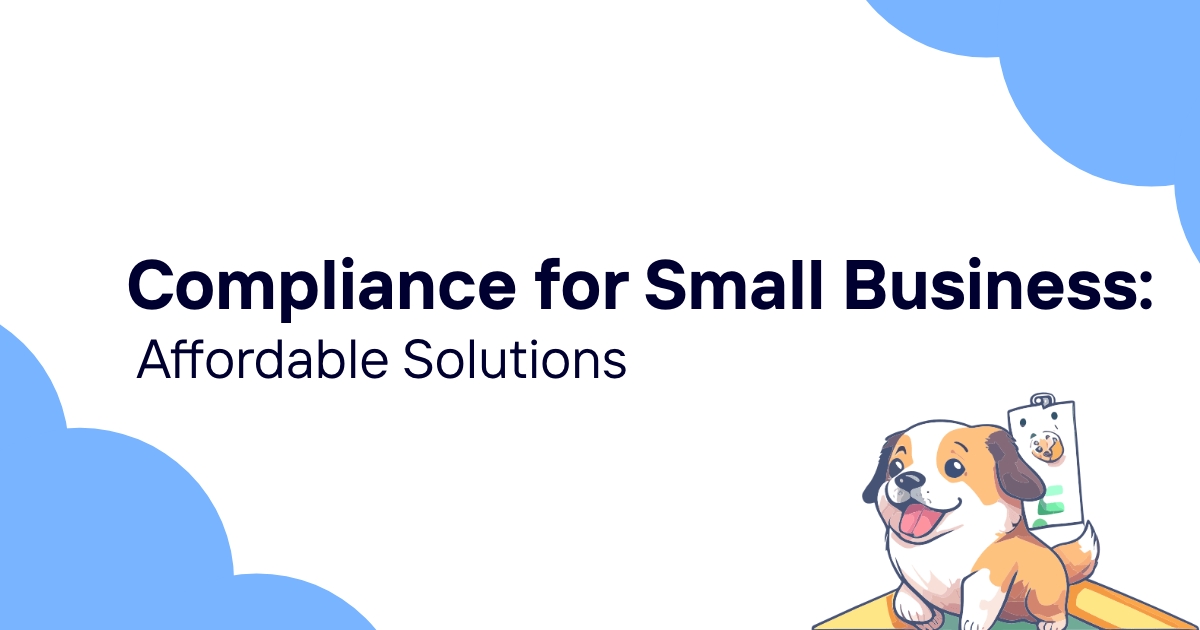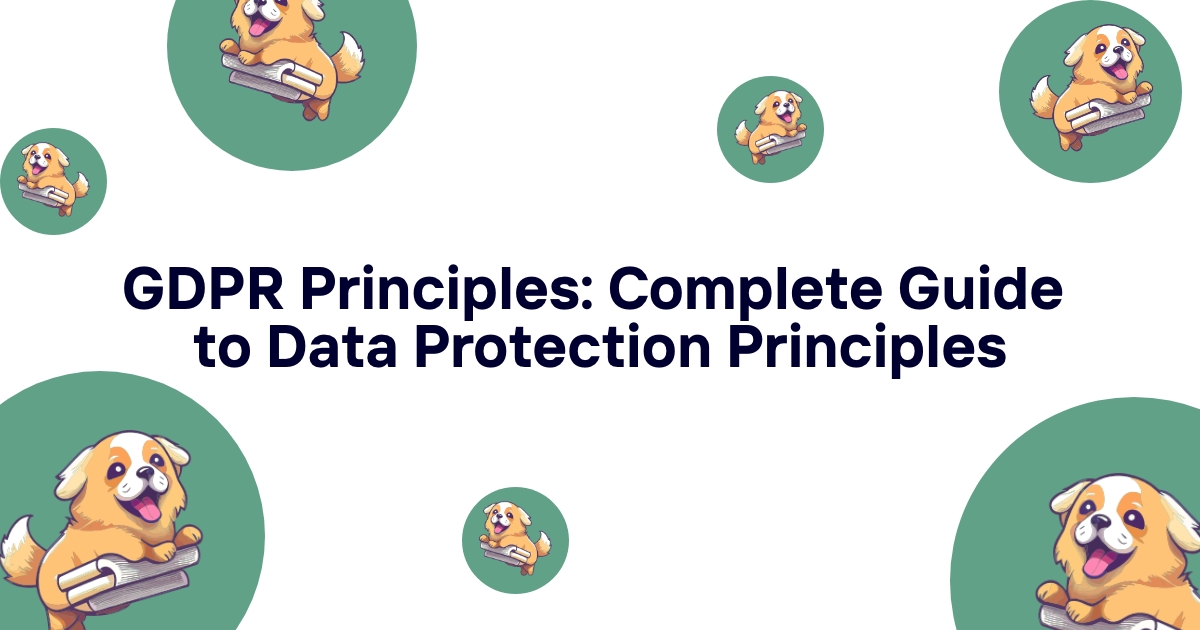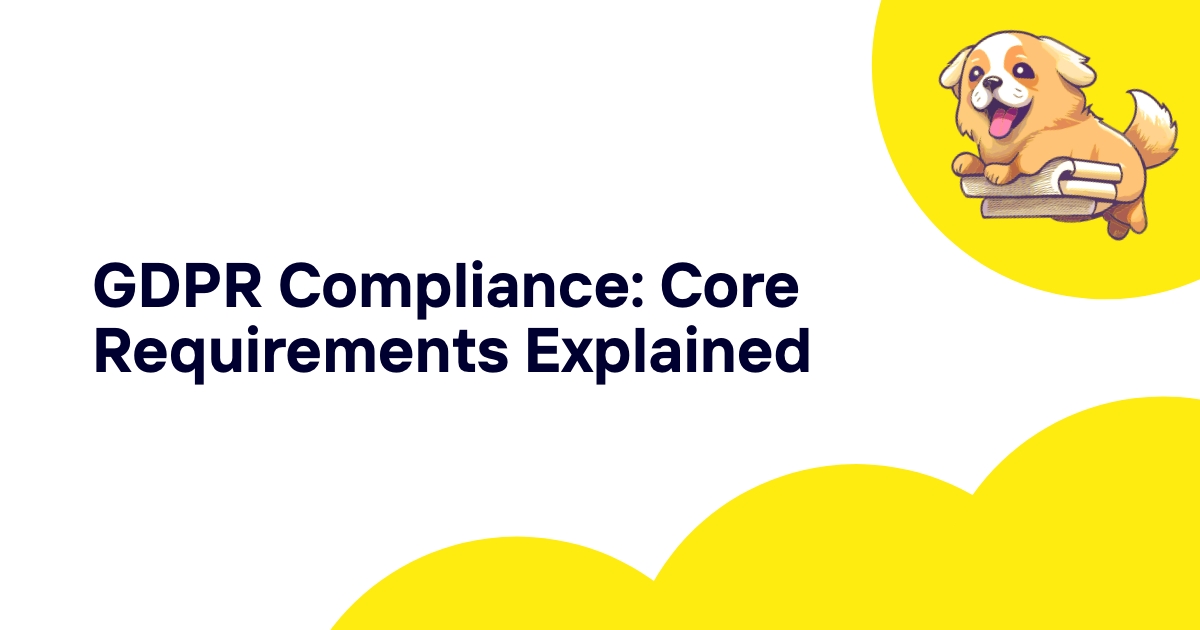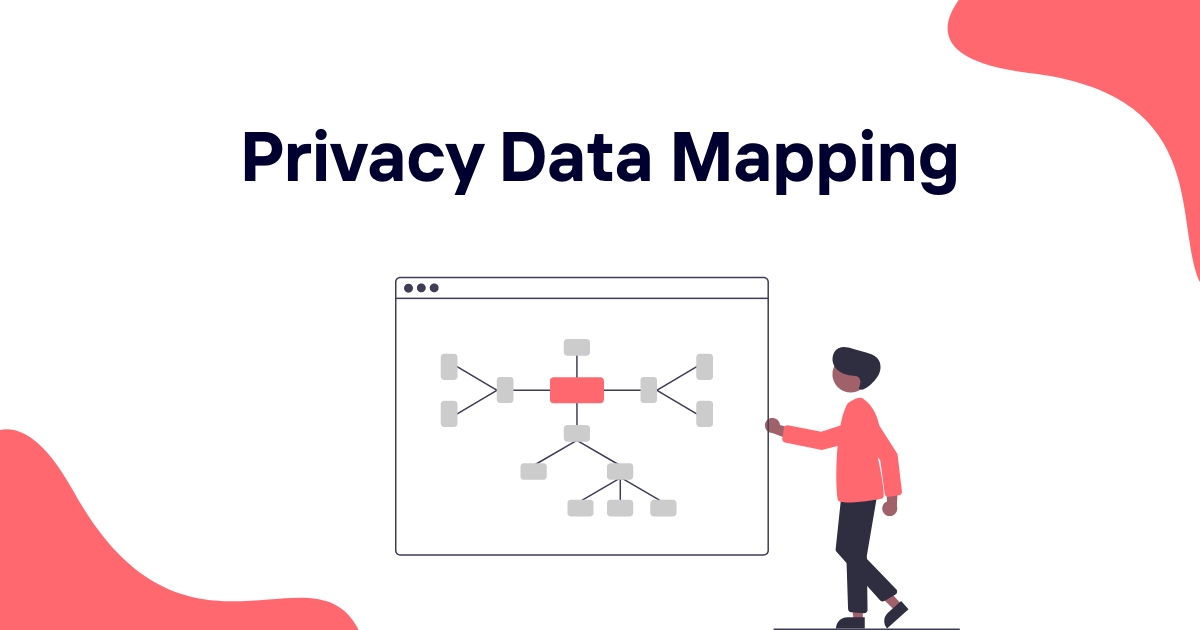Small businesses often assume GDPR compliance requires expensive enterprise software and dedicated privacy teams. The reality is that many small businesses can achieve compliance through practical, cost-effective approaches that fit tight budgets.
The challenge isn't just cost - it's understanding which compliance activities are essential versus those that large enterprises implement but small businesses can often skip or simplify. Focusing on wrong priorities wastes limited resources.
This guide provides practical, affordable strategies for small business GDPR compliance that protect your customers while preserving resources for business growth and operations.
Small Business GDPR Requirements
Scope and Applicability
GDPR applies to small businesses processing personal data of EU residents regardless of business location or size, with limited exceptions for purely domestic activities.
Employee threshold exemptions exist for some requirements like Data Protection Officer appointment, but core compliance obligations apply to businesses of all sizes.
Processing risk levels determine compliance complexity, with simple customer contact management requiring fewer safeguards than extensive behavioral tracking or sensitive data processing.
Regular processing activities require more comprehensive compliance measures than occasional or emergency data processing situations.
Essential Compliance Elements
Lawful basis identification ensures every personal data processing activity has appropriate legal foundation such as consent, contract performance, or legitimate interest.
Individual rights procedures enable customers to access, correct, or delete their personal data through clear, accessible processes.
Security measures protect personal data from unauthorized access, loss, or destruction through technical and organizational safeguards appropriate for business size.
Privacy notices inform individuals about data collection, use, and their rights in clear language that typical customers understand.
Risk-Based Approach
High-risk processing including sensitive data, systematic monitoring, or vulnerable populations requires enhanced safeguards regardless of business size.
Low-risk activities like basic customer contact management can often rely on simpler compliance measures and streamlined procedures.
Risk assessment helps prioritize compliance investments and focus limited resources on areas with greatest privacy impact and regulatory scrutiny.
Proportionality principle allows small businesses to implement measures appropriate for their processing activities rather than enterprise-level solutions.
Regulatory Expectations
Supervisory authorities generally apply proportionate enforcement considering business size, resources, and processing complexity when assessing small business compliance.
Good faith compliance efforts often receive favorable consideration even when implementations aren't perfect or comprehensive.
Willingness to improve and cooperation with authorities typically results in guidance rather than penalties for small businesses making genuine compliance efforts.
Documentation requirements scale with business complexity, allowing simpler record-keeping for straightforward processing activities.
Budget-Friendly Compliance Strategies
Internal Resource Utilization
Existing staff can often handle privacy compliance responsibilities as part of broader business functions rather than requiring dedicated privacy personnel.
Business owner involvement in privacy decisions ensures compliance alignment with business objectives while controlling consultant costs.
Cross-training team members on privacy basics distributes knowledge and creates backup capabilities without additional staffing costs.
Leveraging existing business processes for compliance activities reduces implementation complexity and ongoing management burden.
Free and Low-Cost Resources
Regulatory guidance documents provide comprehensive implementation advice at no cost from supervisory authorities and industry associations.
Template libraries from government agencies and non-profit organizations offer starting points for policies and procedures.
Online training courses and webinars provide privacy education for staff without expensive consultant engagements.
Industry forums and peer networks enable knowledge sharing and problem-solving without professional service fees.
Prioritized Implementation
Core compliance requirements receive immediate attention while nice-to-have features are deferred until resources allow expansion.
High-impact, low-cost measures provide maximum compliance benefit per dollar invested, optimizing limited budget effectiveness.
Phased rollout spreads costs over time while achieving basic compliance quickly and building toward comprehensive protection.
Quick wins demonstrate compliance progress and build momentum for continued investment in privacy protection.
Technology Optimization
Cloud-based solutions often provide enterprise-grade security and compliance features at small business prices through shared infrastructure.
Multi-purpose tools that address several compliance needs simultaneously maximize value from technology investments.
Open-source alternatives can provide functionality similar to expensive commercial solutions with lower licensing costs.
SaaS platforms designed for small businesses often include built-in compliance features that reduce implementation complexity.
Essential vs Nice-to-Have Features
Must-Have Compliance Elements
Data mapping identifies what personal data you collect, where it's stored, and how it's used - essential for any compliance program.
Consent management enables lawful processing when consent is your legal basis, typically crucial for marketing and non-essential data collection.
Individual rights procedures provide required mechanisms for customers to exercise access, correction, and deletion rights.
Security basics including passwords, encryption, and access controls protect against common threats without expensive security solutions.
Important but Flexible Features
Privacy impact assessments are required for high-risk processing but can often be simplified for small business activities.
Staff training ensures consistent privacy practices but can use low-cost online resources rather than expensive consultant-led programs.
Vendor management addresses third-party risks but can focus on essential providers rather than comprehensive supplier programs.
Incident response procedures prepare for potential breaches but can be streamlined for small business environments.
Nice-to-Have Enhancements
Advanced analytics and reporting provide insights into compliance effectiveness but aren't required for basic regulatory adherence.
Automated compliance monitoring reduces manual effort but may not justify costs for small businesses with simple processing activities.
Comprehensive audit programs demonstrate compliance maturity but can be simplified or outsourced for small businesses.
Enterprise-grade features like advanced encryption or sophisticated access controls often exceed small business needs and budgets.
Feature Prioritization Framework
Regulatory requirements take precedence over convenience features when budget constraints require choosing between compliance investments.
Customer-facing features that directly affect individual rights often provide better return on investment than internal efficiency tools.
Risk reduction prioritization focuses spending on areas with highest probability and impact of privacy incidents.
Business benefit consideration ensures compliance investments support rather than hinder business growth and customer satisfaction.
DIY vs Professional Implementation
DIY Compliance Advantages
Cost control enables small businesses to invest in compliance at their own pace without large upfront professional service fees.
Business knowledge application ensures compliance solutions align with actual business processes rather than generic implementations.
Learning opportunity builds internal capabilities that support ongoing compliance management without continued external dependency.
Flexibility allows adjustments and improvements over time as business needs change and compliance understanding grows.
When Professional Help Makes Sense
Complex processing activities including sensitive data or systematic monitoring often benefit from professional risk assessment and mitigation planning.
Legal uncertainty about compliance requirements may warrant professional consultation to avoid costly mistakes or inadequate protection.
Time constraints when rapid compliance is needed might justify professional assistance to accelerate implementation timelines.
High-value customer contracts requiring compliance demonstrations may need professional-grade implementation and documentation.
Hybrid Approach Benefits
Professional consultation for initial assessment and planning combined with internal implementation often provides optimal cost-effectiveness.
Spot consulting for specific questions or challenges enables targeted professional input without comprehensive service engagements.
Training and coaching arrangements build internal capabilities while providing professional guidance during initial implementation.
Review and validation services ensure DIY implementations meet compliance requirements without full professional management.
Professional Service Selection
Local expertise often provides better value and understanding of regional business environments and regulatory expectations.
Specialized small business privacy consultants understand resource constraints and can provide appropriate solutions.
Fixed-fee arrangements provide cost predictability and prevent surprise expenses that could strain small business budgets.
Ongoing support options enable continued professional relationship without large upfront commitments.
Affordable GDPR Tools and Software
Free and Open Source Options
Privacy policy generators provide starting points for privacy notices without legal drafting costs, though customization may be needed.
Consent management plugins for websites enable basic consent collection and management without expensive commercial platforms.
Security tools including password managers and basic encryption software provide essential protection at minimal cost.
Documentation templates from regulatory authorities and industry groups support compliance record-keeping without custom development.
Low-Cost Commercial Solutions
Small business privacy platforms often provide comprehensive compliance features at affordable monthly subscription rates.
Cloud-based solutions eliminate infrastructure costs while providing enterprise-grade security and compliance capabilities.
Multi-purpose business tools increasingly include privacy features, maximizing value from existing software investments.
Industry-specific solutions designed for particular business types often provide relevant features at reasonable costs.
Tool Selection Criteria
Ease of use ensures tools can be operated by existing staff without extensive training or technical expertise.
Scalability allows growth from basic compliance to more sophisticated features as business needs and budgets expand.
Integration capability enables tools to work with existing business systems without expensive custom development.
Support availability ensures assistance is available when needed without premium support contracts.
Implementation Prioritization
Essential tools for legal basis documentation and individual rights management receive priority investment.
Security tools that protect against common threats provide immediate risk reduction at reasonable costs.
Automation tools that reduce ongoing compliance burden justify investment through labor savings over time.
Reporting and documentation tools support regulatory interaction and customer confidence building.
Phased Implementation Approach
Phase 1: Immediate Essentials (Weeks 1-4)
Data inventory identifies what personal data you process and establishes foundation for all other compliance activities.
Privacy policy creation or update ensures customers receive required information about data processing activities.
Basic security measures including strong passwords and software updates address immediate security vulnerabilities.
Staff awareness training provides essential privacy knowledge for team members handling personal data.
Phase 2: Core Compliance (Months 2-3)
Consent mechanisms implementation enables lawful processing for marketing and non-essential data collection activities.
Individual rights procedures establish processes for handling customer requests for access, correction, and deletion.
Vendor assessment reviews third-party services to ensure appropriate data protection agreements are in place.
Incident response planning prepares for potential privacy incidents and regulatory notification requirements.
Phase 3: Enhanced Protection (Months 4-6)
Security improvements including encryption and access controls provide additional protection against data breaches.
Process documentation creates records of privacy procedures and decision-making for regulatory demonstration.
Training program expansion ensures all staff understand privacy responsibilities and implement consistent practices.
Monitoring systems enable detection of potential privacy issues before they become serious problems.
Phase 4: Optimization and Growth (Ongoing)
Regular assessment identifies areas where compliance improvements might enhance protection or efficiency.
Technology upgrades provide enhanced capabilities as budget allows and business needs evolve.
Best practice adoption keeps compliance current with regulatory guidance and industry standards.
Consider potential penalty calculations when prioritizing compliance investments for maximum risk reduction.
Small Business Compliance Priorities
Customer Trust Building
Transparent privacy practices demonstrate respect for customer rights and often provide competitive advantages over less privacy-conscious competitors.
Clear communication about data use builds customer confidence and can support premium pricing or customer loyalty.
Responsive individual rights handling shows customers their privacy concerns are taken seriously and addressed promptly.
Proactive privacy protection often generates positive word-of-mouth marketing and customer referrals.
Risk Management Focus
Data breach prevention through basic security measures provides essential protection against common threats that affect small businesses.
Regulatory compliance reduces risk of enforcement action and potential penalties that could seriously impact small business finances.
Vendor risk management ensures third-party services don't create unexpected privacy liabilities or compliance obligations.
Business continuity planning includes privacy incident response to minimize disruption when problems occur.
Operational Efficiency
Streamlined privacy processes reduce administrative burden while meeting compliance requirements.
Integrated privacy controls minimize separate compliance activities by building protection into normal business operations.
Automated features reduce ongoing manual effort required for compliance maintenance and individual rights fulfillment.
Clear procedures enable consistent privacy practices without requiring constant decision-making or expert consultation.
Growth Preparation
Scalable privacy infrastructure supports business growth without requiring complete compliance system replacement.
Documentation and procedures enable smooth transition when adding staff or expanding operations.
Customer privacy capabilities often become selling points when pursuing larger clients or premium market segments.
Compliance maturity positions businesses for potential acquisition or investment opportunities that require privacy due diligence.
Cost-Effective Ongoing Management
Routine Maintenance Activities
Regular privacy policy review ensures information remains current as business practices evolve.
Periodic staff training refreshes privacy knowledge and addresses new team members or changing responsibilities.
Security update monitoring maintains protection against evolving threats without expensive security services.
Vendor relationship review ensures third-party services continue meeting privacy requirements and contractual obligations.
Efficient Record Keeping
Simple documentation systems capture essential compliance information without complex database management.
Cloud storage solutions provide secure, accessible record-keeping at reasonable costs with automatic backup protection.
Template-based documentation reduces time required for privacy assessments and decision recording.
Integrated business systems eliminate duplicate data entry and maintain consistency across different business functions.
Compliance Monitoring
Basic metrics tracking helps identify trends and potential issues before they require expensive remediation.
Customer feedback monitoring identifies privacy concerns that might need attention or process improvement.
Regulatory update tracking ensures awareness of new requirements or guidance affecting small business compliance.
Peer networking through industry associations provides insights into compliance best practices and common challenges.
Resource Optimization
Cross-training staff members ensures privacy expertise isn't concentrated in single individuals who might leave the business.
Outsourcing specific activities like privacy policy drafting can be more cost-effective than maintaining internal capabilities.
Technology consolidation reduces software licensing costs while maintaining essential compliance functionality.
Continuous improvement focus identifies opportunities to enhance privacy protection while reducing costs or administrative burden.
Small business GDPR compliance requires strategic thinking about resource allocation and priority setting rather than simply implementing scaled-down enterprise solutions. Organizations that focus on essential compliance elements while building toward comprehensive protection typically achieve better outcomes than those attempting immediate full implementation.
Effective small business privacy programs provide essential protection while supporting business growth through customer trust and operational efficiency.
Ready to implement affordable GDPR compliance for your small business? Use ComplyDog and access cost-effective compliance tools, templates, and guidance designed specifically for small business needs and budgets.


















